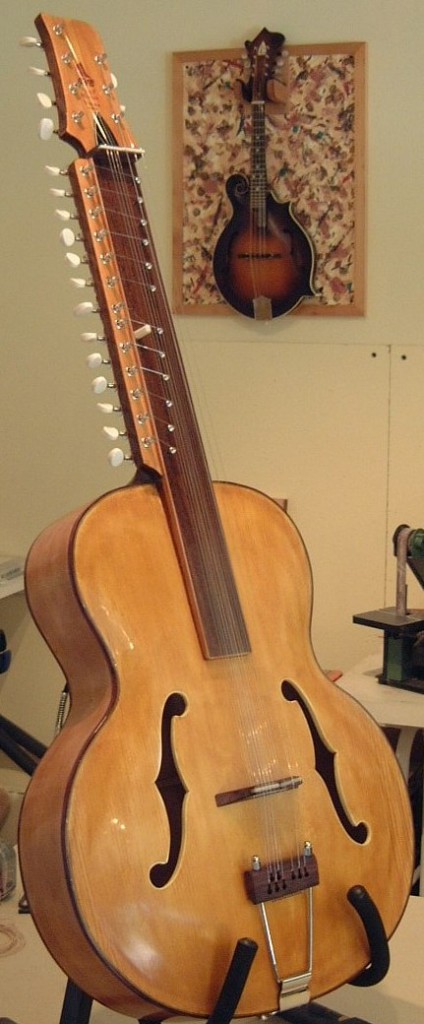 It was one fine day in 1968 when a 15 year old Vishwa Mohan Bhatt, who was then learning the Sitar, stumbled across a Spanish guitar brought by a German student at his father Manmohan Bhatt’s music school. He set about experimenting with it, trying to modify its structure to suit Indian music. What resulted was an Indian version of the Hawaiian slide guitar designed to play Indian classical music, the Mohan Veena.
It was one fine day in 1968 when a 15 year old Vishwa Mohan Bhatt, who was then learning the Sitar, stumbled across a Spanish guitar brought by a German student at his father Manmohan Bhatt’s music school. He set about experimenting with it, trying to modify its structure to suit Indian music. What resulted was an Indian version of the Hawaiian slide guitar designed to play Indian classical music, the Mohan Veena.
Most basically an archtop guitar, the Mohan Veena consists of 20 strings, three melody strings and five drone strings coming out of the peg heads and 12 sympathetic strings wound around respective tuning pegs set on a piece of wood by the side of the neck. It is played like a Hawaiian slide guitar, with the first two fingers of the right hand used to strike the string (a technique developed by Bhatt himself) with a metal or plastic wrap for the thumb, and the left hand for sliding with the help of a steel rod or slide.
Bhatt drew a lot of flak from the purists for what they termed as a dilution of traditional music, when he forayed into fusion music with the Mohan Veena. Nevertheless, he has managed to silence the critics with his immense success in the field, even winning a Grammy in 1994 for the album A Meeting by the River done with American slide guitarist Ry Cooder. Unknown to a lot of people, he has played in movies for A R Rahman in movies like Iruvar. The distinct sound of the Mohan Veena can be discerned especially in the interludes of the song Narumugaiye. There is a Mohan Veena solo version of Jana Gana Mana in Rahman’s album of the same name. He also scored music for a Hindi movie named Bawandar. Other famous players of the Mohan Veena include folk musician Harry Manx who studied as a student of Bhatt for five years, and Matt Malley, founder and bass guitarist of rock band Counting Crows.
Vishwa Mohan Bhatt’s elder son Salil Bhatt is an accomplished player of the Mohan Veena. Not to be outdone by his father, he went on to create his own version of the instrument, which he calls the Satvik Veena. While the shape and design are almost similar, Satvik Veena is an all-wooden instrument, tail-piece, tuning pegs and all, as opposed to the metal counterparts on a Mohan Veena. The tuning pegs are also concealed in a Satvik Veena, thereby keeping the tuning intact. And Salil with his Satvik Veena has already won a lot of acclaims all over the world. Talk about chip off the old block!!
|
Vishwa Mohan Bhatt’s solo version of Jana Gana Mana in Rahman’s album.
Harry Manx talking about the Mohan Veena and performing Reuben’s Train on the same.
Vishwa Mohan Bhatt (Mohan Veena), Salil Bhatt (Satvik Veena) and Doug Cox (Dobro) performing a piece from their album Band of Gypsies



